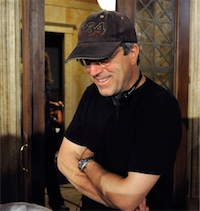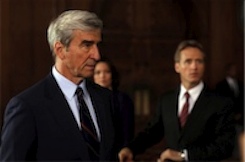“It is not disloyal to hold our officials to the highest standards of conduct.” That statement comes from a prosecutor near the end of the trial of a group of senior Bush Administration officials. Law & Order, America’s longest running television program, put the Bush Administration’s torture memo writers in the dock in a homicide prosecution. In so doing, the writers made several points that have been almost entirely neglected by the Beltway punditry–for example, that the core of the torture controversy revolves around homicides, and that torture prosecutions by their nature involve conspiracy offenses implicating all those in the decision-making chain. I put six questions to the episode’s author, and Law & Order’s Executive Producer and Head Writer, René Balcer.
1. You launched Law & Order’s twentieth season with an episode focusing on the potential culpability of one of the Bush Administration’s torture lawyers. The episode opens with the plight of Greg Tanner, a U.S. soldier who served at Abu Ghraib, witnessed torture, suffered post-traumatic stress, and was then separated from the military without medical assistance. Your programs are always “torn from the headlines.” Give us a sense of the cases you looked at in constructing Greg Tanner. Alyssa Peterson? Eric Fair?

My co-writer Keith Eisner and I were aware of the Fair and Peterson cases and of many other instances of former participants in enhanced interrogations who had difficulty processing and rationalizing their experience. In 2005, while researching an episode of Law & Order Criminal Intent, I read interviews with medical personnel, psychiatrists in particular, who had served as advisors to such interrogations. Many of them had trouble justifying in their own minds their participation and incremental violation of their Hippocratic oath to “do no harm.” This research indicated that torture permanently scars not only the tortured but also the person ordered to conduct such interrogations. It seems clear to me that torture injures everyone who comes into contact with it and corrodes the country that abides it.
As for the military’s unfair treatment of Tanner’s ptsd, that topic had been widely reported in the media and was the subject of a 2007 episode of Law & Order. In general, I’m sympathetic to the decent and hapless footsoldier into whose lap falls the unenviable duty of carrying out fubar policies.
2. The episode’s torture lawyer is Franklin, a former Justice Department lawyer, now law professor, who shoots Tanner after being accosted in a parking garage. He sounds like John Yoo and looks like Jay Bybee, so you’ve done an interesting montage. Franklin exhibits real sangfroid in this episode—almost to the point of creepiness—and he wields some unusual legal tricks to avoid indictment, including a writ of prohibition and personally appearing before the grand jury to talk them into a “no true bill.” All of this is theoretically possible, of course, but almost unknown in real criminal justice practice. Weren’t you straining the real world feel of Law & Order with these twists?
On my watch, we’ve never done anything on Law & Order that was not legally possible nor sustainable by an actual court decision. We have a number of former prosecutors and defense attorneys on the payroll as advisors who keep us from crossing the line. That said, we have found novel ways of using the legal tools at our lawyers’ disposal. In this case, I wanted to demonstrate that the lawyers who wrote these memos weren’t third-rate hacks. Many were from prestigious schools and had graduated at the top of their class. And yet their memos often seem like the work of first-year law students – Yoo’s memo bizarrely quotes a health care statute’s definition of an “emergency condition” to explain the meaning of “severe pain” in the context of torture. These memos would not have passed our own internal “Law & Order smell-test” of legal verisimilitude. That these bright people could come up with such nonsense perhaps reflects that, faced with the impossible task of legally justifying the President’s use of torture, they had to strain their legal wizardry to absurd limits. Instead, they would have better served their bosses by telling them, “Nope, sorry, can’t be done. No way no how it’s legal.”
3. You rested very heavily on John Yoo’s actual language from memos and debates for Franklin’s justifications of what he did. The horrific torture incident that Tanner describes also sounds like the torture-homicide of Manadel al-Jamadi. Most of the debate has focused on waterboarding or other practices that torture apologists justify as college fraternity pranks. But you come to focus squarely on a homicide. Why?
A murder case is far more compelling than a simple assault case – the stakes are higher, it commands attention. And since there were many actual cases of torture-homicide resulting from the war on terror, we saw no reason to pull our punches.
4. In one of the most dramatic courtroom moments, you have a defense lawyer confront an interrogation expert with the famous “ticking bomb” scenario, who answers it quite simply. Are we hearing Ali Soufan combined with Matthew Alexander?
You heard what I’ve been hearing for years from a variety of professional interrogators – torture, physical abuse, and mental abuse don’t yield reliable information. I’ve been interested in the subject of interrogations for many years, principally because of my friendship with the noted forensic psychiatrist Dr. Park Dietz, who has used with consistent success an empathic approach to elicit admissions and information from the most depraved and recalcitrant offenders. Putting aside for a moment whether torture is legal or ethical or consistent with our values, if we are interested in a results-based strategy to gain actionable information, the overwhelming evidence – including the recent Trinity College neuroscience study – seems to indicate that torture isn’t the way to go.
5. Torture is a classical conspiracy offense, and your script makes that point by joining the whole chain of command to the list of defendants. This has been the ultimate political argument against a prosecution of the torture conspirators—namely, it would inevitably go to the top of the command. You have a couple of dense scenes, but do you think you were able to unpack this issue fairly enough?

Given we only have 41 minutes of actual running time to tell our story, probably not. But I feel the issue was raised in a credible manner – if perhaps not answered to everyone’s satisfaction by our DA Jack McCoy. After all, it’s not his job to worry about where the political chips might fall; his job is only to prosecute offenders. In writing this episode, I was reacting to the basic unfairness of a real-world investigation that limits itself at the outset to investigating wrongdoing by only the lowest-level operatives and contractors. In many ways, they – along with the guards and minders at the detainee camps – are like mice trying their best to navigate a crazy maze not of their design. Arguably they are the least culpable, while those who articulated, implemented, and enabled a policy of torture should be the particular focus of a special prosecutor’s scrutiny.
6. You got a lot of criticism from the right, with some of it implying that you are carrying water for the Obama Administration—a pretty strange criticism in light of the direct criticism your DA expresses of their “look forward, not backwards” shtick. In view of the criticisms you’ve heard, is there anything you’d change if you were doing it again?
I wouldn’t change anything. What many of these critics fail to realize is that Law & Order has always been an equal-opportunity offender, and if a Democratic administration had implemented this despicable policy, our show would have taken them to task for it. Ultimately the episode was advocating for the public’s right to inquire into what our government did and is doing in our name. All great nations make mistakes. What is unique to the American system is that powerful self-correcting mechanisms are enshrined in our Constitution – checks and balances, freedom of expression, freedom of the press, etc. Some on both sides of the ideological spectrum would deny to others the exercise of those mechanisms while appropriating it to themselves. We by nature mistrust authority no matter who wields it – and I think that’s healthy. Though I disagreed with him on the facts, I fully support Rep. Joe Wilson’s right to call out President Obama – I just wish Democrats had had the balls to call out President Bush when he was peddling his lies to Congress.
“Memo from the Dark Side” can be viewed here by clicking on “Episode 1” and then choosing whether you wish to view the episode on Netflix or iTunes.


